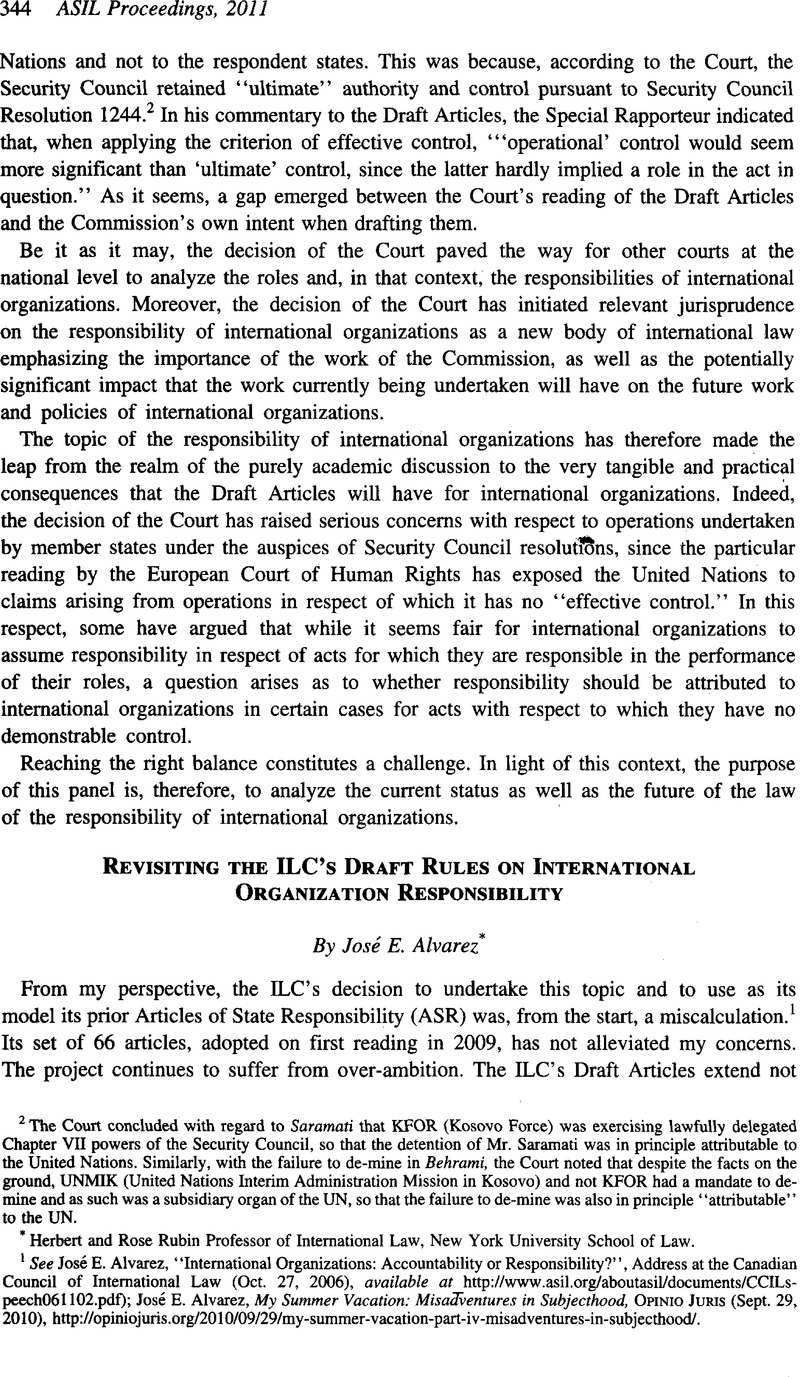Article contents
Revisiting The ILC’s Draft Rules on International Organization Responsibility
Published online by Cambridge University Press: 28 February 2017
Abstract

- Type
- The Roles and Responsibilities of International Organizations
- Information
- Copyright
- Copyright © American Society of International Law 2011
References
1 See José E. Alvarez, “International Organizations: Accountability or Responsibility?”, Address at the Canadian Council of International Law (Oct. 27, 2006), available at http://www.asil.org/aboutasil/documents/CCILs-peech061102.pdf); José E. Alvarez, My Summer Vacation: Misadventures in Subjecthood, Opinio Juris (Sept. 29, 2010), http://opiniojuris.org/2010/09/29/my-summer-vacation-part-iv-misadventures-in-subjecthood/.
2 See Arts. 57 (liability for states that “aid or assist” an Io in wrongful acts); 58 (for states that “direct” or “control” an Io); 59 (for states that “coerce” an Io); 60 (for states that seek to avoid their own obligations by “talcing advantage” of an Io’s competence); 61 (residual state responsibility in certain other cases of wrongful acts by Ios); 62 (a “without prejudice” clause reserving the responsibility of the Io in the preceding instances).
3 The most notable exceptions being Articles 16-17, 39, 51, 60-61. These have no clear counterparts in the ASR. For a chart comparing the texts of the ASR and the Ilc’s 66 draft articles of Io responsibility, see the attachment to http://www.law.nyu.edU/ecm_dlvl/groups/public/@nyu_law_website__facultyJaculty_profiles jalvarez/documents/documents/ecm_pro_066900.pdf.
4 As occurred with the ASR even with these were in draft form, the Ilc’s draft Io articles have already been cited, even in their provisional form, by some courts.
5 At the same time, the Ilc’s draft commentaries for its Io articles ignore a great deal of arguably relevant practice, including national court decisions involving Io immunity or legal personality or the work of international administrative tribunals. Compare Germany’s response to the Ilc’s inquires, relying on Io constituent instruments, headquarters agreements, status of forces agreements, other multilateral treaties, the jurisprudence of national and international courts, and other evidence of state practice for its conclusions that “there is no customary international law on the responsibility of Ios” and that there is no presumption that either IOS or states are responsible for Io actions. See Doc. A/CN.4/556.
6 Compare, e.g., Arts. 5 (attribution as Io agent depends on Io rules) to 7 (permitting such attribution “even though the conduct exceeds authority or instructions granted’ ‘ ) and 8 (permitting such attribution where Io “acknowledges and adopts the conduct”); or any of a number of articles that appear to apply irrespective of whether the Io (or the state) acted in accordance with Io rules and procedures such as 9 (Io acts not in conformity with an international obligation), 11(3) (anticipating Io breaches of a duty “to prevent”), 16(3) (anticipating Io responsibility in certain cases when it directs another Io to take action), 50 and 54 (permitting an Io to take countermeasures against another Io in certain cases), 57 (anticipating state responsibility where it “aids or assists” an Ю), 58 (anticipating state responsibility where it “direct and controls” an Io), 59 (anticipating state liability where it “coerces” an Io). On the other hand, the articles include 51 (permitting an injured state to take countermeasures against an Io but only when this is “not inconsistent’ ‘with the rules of the IO) and 63 (indicating that none of the Io articles apply when “governed by special rules of international law, including rules of the organization applicable to the relations between the Io and its members”).
7 See also the Id’s warning (in the Reparation Case (1949)), that the United Nations is neither a state nor a “superstate,” but its capacities are determined by seeing whether an asserted power is “functionally necessary,” given the UN’s specific duties under the UN Charter.
8 See also Arts. 20-24 (presuming in principle that all Ios can invoke self-defense, countermeasures, force majeure, distress, and necessity despite their differing mandates and the lack of common understanding on the preconditions for such defenses).
9 Given the level of U.S. contributions to IOS, the United States would appear to have a keen interest in the potential for Io liability.
- 1
- Cited by


